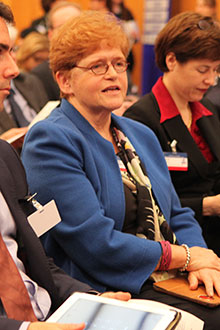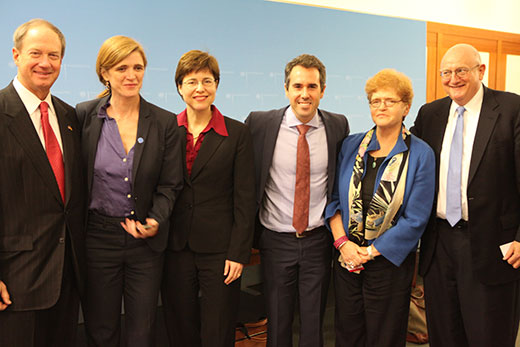For years, Emory professor Deborah Lipstadt has been tracking anti-Semitic incidents, both large and small, as they flared up across Europe like scattered spot fires.
Attacks on a Jewish day school in Toulouse, France, and a Jewish Museum in Brussels. Pro-Gaza demonstrators in Frankfurt openly chanting, “Hamas, Hamas; Jews to the gas.” A group of Parisian Jews trapped in a synagogue by pro-Palestinian rioters. Signs in Rome urging a boycott of 50 Jewish-owned businesses. A London grocery store removing kosher products from its shelves in response to anti-Israel protesters…
To Lipstadt, Dorot Professor of Modern Jewish and Holocaust Studies, the rise in contemporary anti-Semitism throughout Europe — and the failure of communities to crack down on it — is more than a troubling trend.
“To Jews in many European communities, as much as a physical assault and violent rhetoric, it represents an inner assault on their security,” she explains.
That was one of the messages Lipstadt took from Berlin last week as she joined a six-member delegation appointed by President Barack Obama to attend the 10th anniversary of the Organization for Security and Cooperation in Europe (OSCE) Conference on Anti-Semitism, held Nov. 12-13.
“President Obama believes that anti-Semitism is not only a threat to the Jewish community but to the ideals we advance through our support for human rights and democratic governance around the world,” says Melissa Rogers, executive director of the White House Office of Faith-based and Neighborhood Partnerships. “Particularly in light of alarming signs of anti-Semitism’s rise, OSCE states must now follow up on the 2004 Berlin Declaration with updated and specific plans of action.”
“The White House was honored that Professor Lipstadt, a highly respected scholar and public intellectual, could participate in this delegation,” Rogers adds. “The Administration looks forward to continuing to work with Professor Lipstadt and many other partners at home and abroad to eliminate the scourge of anti-Semitism.”
The event, which was organized by the Federal Ministry of Foreign Affairs, Swiss OSCE Chairmanship and the OSCE Office for Democratic Institutions and Human Rights (ODIHR), drew international political leaders, government officials and civil society representatives from across the OSCE region.
“Ten years ago the OSCE States, meeting at the Federal Foreign Office in Berlin, made a strong commitment to oppose anti-Semitism — events witnessed in many European countries this summer have shown that the fight against anti-Semitism is, regrettably, still necessary and urgent,” said Federal Foreign Minister of Germany Frank-Walter Steinmeier, who hosted the conference, during introductory remarks.

Professor Deborah Lipstadt, shown here attending the Berlin conference, says the event will provide fodder for her ongoing research into contemporary anti-Semitism.
The growing threat of anti-Semitism
Led by U.N. Ambassador Samantha Power, a foreign policy and human rights scholar and former Atlanta resident, the delegation gathered in Berlin to explore challenges related to the rise of anti-Semitism in communities throughout Europe, which has increasingly taken new and troubling forms.
“Make no mistake — we have a problem,” Power told the gathering, describing the upswing in anti-Semitic acts as not only a threat to Jewish communities, but also “a threat to the larger project of European liberalism and pluralism.”
Flanked by U.S. ambassadors and presidential advisers, Lipstadt was one of only two members of the delegation who were not federal officials. The other civilian delegate was Abraham Foxman, national director of the Anti-Defamation League, “one of the most prominent Jewish groups in the United States,” says Lipstadt. “I was in good company.”
“It’s always interesting to talk to people involved in this on a policy level —they looked to us for our read on what’s going on,” she adds. “I stressed to other members of our delegation — and they agreed — that while this is not another Holocaust, and is not state-sponsored discrimination and anti-Semitism, it’s certainly not nothing — it’s serious.”
In the past 20 years, Europe has seen a renaissance of Jewish life, notes Lipstadt. While many Jewish communities are flourishing, the recent rise in anti-Semitism presents a danger of that progress being reversed, she says.
Lipstadt found what she heard at the conference unsettling. “Many vibrant, engaging, well-educated young Jews, whether Belgian, Dutch, French or German, are beginning to feel as if there isn’t a place for them in Europe,” she says. “They talk about friends who leave the country or go underground and become ‘invisible’ Jews.”
For many of these young Jews, emigrating is not easy. And so they remain where they are, but elect to disappear from Jewish life, she explains. And increasing numbers are leaving.
“It’s kind of mind-boggling, more than 60 years after the end of World War II, small towns in Europe are poised to become empty of Jews,” Lipstadt observes.
“Some of the French and Belgian Jews we spoke to, who can trace their families back 100 years, are saying, ‘I’m not secure here.’ That should send a shiver up the spine of the leaders and the population of their countries,” she adds.
Experience will feed research
This marks the second time Lipstadt has served on a presidential delegation to the international OSCE conference on discrimination. Her first appointment came 10 years ago under the George W. Bush administration.
This year, the invitation to attend the two-day conference came with little notice — a call came from the White House only days before the event. Working with the U.S. State Department, she was advised on formal protocol, even down to how she should dress.
“Overall, it was a great experience. I was on the ground an intense 40 hours,” says Lipstadt, who adds that it will provide fodder for her ongoing research on a book project, planned long before the conference, that explores the rise of contemporary anti-Semitism.
“The conference gave me a very strong perspective,” she says. “I knew about the (anti-Semitic) rallies, the cries, the murders. This gave me more insight into personal, private lives, how it is impacting people on a micro level. It left me very sobered.”

